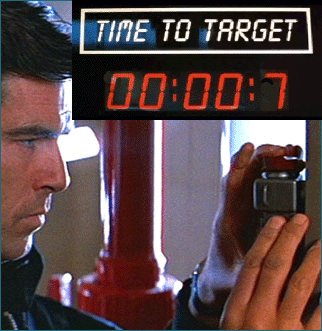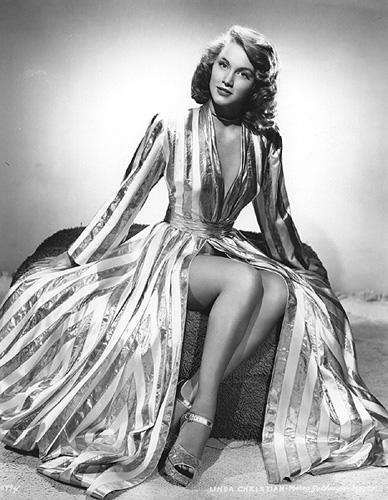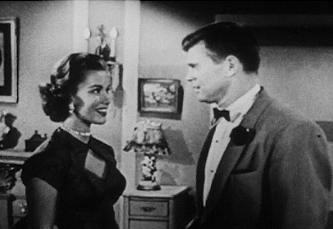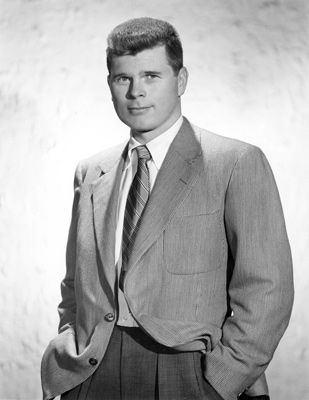Just before airtime, the producers realized the
sixty-minute production was over by three minutes.
"So they went through and cut three words
here, a line there, a half-a-word here, and their script ended up looking like a
bad case of tic-tac-toe." recalled Barry Nelson in a Starlog interview from
1983. I tell you it was so frightening that when I entered (the scene) my only
thought was, ‘Oh, God, if I can only get out of this mother!’" "I
was very dissatisfied with the part, I thought they wrote it poorly. No charm or
character or anything."
Peter Lorre agreed and saw Nelson so nervous with
all the changes to the script that he commented, "Straighten up, Barry, so
I can kill you!"
For decades afterwards, Bond fans had wondered
why Barry Nelson was chosen for the role. However, his
main reason for accepting the part was simply to work with Peter Lorre.
Nelson was a great admirer of Lorre's work and felt he might never get another
opportunity to work with him again.
The live performance was considered lost on the
pretense that it was not filmed on a 16mm kinescope telecine. However, in
1981 a Chicago airline executive named Jim Schoenberger discovered, while
sifting through old film canisters of presumably the 1967 version of Casino
Royale, the black and white film strip. Quickly he ran the film
through a projector and found a pristine copy of the 1954 production. The
film had its first public performance at the James Bond Weekend in July 1981.
Barry Nelson was also in attendance.
VHS and DVD copies are available including one
VHS version from Spyguise that has
an additional 60 seconds where Le Chiffre is shot not once, but twice before
succumbing to an eternal sleep.
As if the future of the TV production of Casino
Royale’s fate was foreshadowed in the first few seconds of the live
production, when a prop gun misfired, so would the novel for the next fifty
years misfire on the theater screen.
From A Russian, With Love?
In 1955, flamboyant Russian actor and director
Gregory Ratoff was in Cairo, Egypt. According to the story by screenwriter
Lorenzo Semple, Jr. (he would also pen the 1960's Batman TV series and
the screenplay to Never Say Never Again) , "Gregory had been acting
in a film titled The Royal Bed, which was about King Farouk. It was a big
rip-off. Everyone was trying to rob as much money as possible from the Italian
backers, who weren’t allowed into the country. Gregory stole 10,000 pounds in cash,
and needed a way to get it out of Egypt. He got down on his knees at the
Cairo airport and prayed: ‘As God is my witness, if I get through with this
cash, I’m going to buy a TIME magazine when we land in Athens, and use the
money to purchase film rights to the first book I read a review of’."
The book turned out to be Casino Royale.
Ratoff borrowed money from then- head of 20thCentury
Fox, Darryl Zanuck and long time friend and producer Charles K. Feldman and paid
Fleming $6000.00 for the film rights. During the next five years, Ratoff tried
to bring James Bond to the silver screen - unsuccessfully.
"I was a bright young guy fresh out of
college." said Semple, "Gregory hired me to write the screenplay. I
worked without pay, but it was a great deal of fun. We traveled around the world
while he gambled in casinos, supposedly doing research. He was too old-fashioned
to work, so I would sit at the typewriter for four or five hours a day in
whatever hotel we were staying in, and just turn out pages and pages of scenes.
I probably wrote several scripts during a year of traveling throughout Europe.
Gregory thought the story was too silly. He said: ‘Nobody believe this James
Bond, so we make him into woman. Then, we make great movie.’ The idea was to
write it as a vehicle for actress Susan Hayward."

Flamboyant actor and director Gregory Ratoff
envisioned actress Susan Hayward as secret agent Jane Bond.
On December 14, 1960, Gregory Ratoff died from
leukemia and his widow was left holding the proverbial empty bank account. She
was forced to sell any film properties her late husband owned to get out of debt.
Feldman was one of the creditors to the Ratoff estate. The former lawyer turned
talent scout and producer was handed the film rights to Casino Royale.
A Cry to Battle
Feldman was one of Hollywood’s most intelligent
and cultivated talent agents. Handsome, tanned and sophisticated, He was the
full definition of success. His yearly salary in 1933 (at the height of the
Great Depression) was approximately $500,000 before taxes. His company, Famous
Artists, specialized in bringing new and aspiring talent to the studio system.
His 300 client list included John Wayne, Richard Burton, Greta Garbo, Tyrone
Power, William Holden, George Raft, Lana Turner and Marilyn Monroe.
Born April 26, 1905 in New York City. One of six
children whose family name was Gould. Left as an orphan, he was adopted by the
Samuel Feldman family of Bayonne, New Jersey. The family moved to California a
few years later. By college, Feldman took up law at the University of California
at Los Angeles. His first contact with the movie industry occurred during school
vacations when he worked at the studios. One of his earliest jobs was as an
assistant cameraman for director John (The Searchers) Ford.
Feldman started his own law practice in Hollywood
and specialized in the contractual aspects of the film industry. He came up with
the idea of creating jobs for his clients instead of fighting for the few
available ones. This was the origin of what became known as the ‘package deal’.
For example, after buying a story idea for as little as $2,500, he found an
unemployed writer, actor, director and producer. He once said, "I didn’t
go into competition with the studios. I just bought what they didn’t want or
had passed up. I would wrap a story up, then stick an important name on the
label, usually the name of a star or top director. The rest was easy. No
producer in his right mind would turn down a deal like that."
During his years as a producer, Feldman would
bring to the screen films that Hollywood was afraid to touch. Films such
as A Streetcar Named Desire, The Glass Menagerie, The Seven
Year Itch, and What's New, Pussycat?
After listening to an inspiring speech in 1942 by
then U.S. Vice President Henry Wallace, Feldman had a brainstorm of an idea.
He conceived an episodic film that would highlight war fronts during WWII. The
six hour film was to be titled "Battle Cry" and enlisted an
army of writers including Ben Hecht and Pearl Buck. He even tried to convince
the studio heads to make this film on a non-commercial charity basis. Many
famous actors and actresses agreed to volunteer their time for this epic
production and were promised that they would only work 12 days. A list of famous
actors included Humphrey Bogart, Lauren Bacall, Gary Cooper, Bette Davis, Ida
Lupino, Marlene Dietrich, Charles Boyer, Claudette Colbert, Leslie Howard,
Ingrid Bergman, Irene Dunne, Randolph Scott, Merle Oberon, Jean Arthur, Margaret
Sullivan, John Garfield, Ann Sheridan, and George Raft were all at one time
committed. Film directors Lewis Milestone, Alexander Korda, and Howard Hawks
among others were being touted to direct their own segments. Only one scene was
filmed and that was of a burning wheat field in upper state California before
Jack Warner sent word to shut down production because of escalating cost.
Feldman’s epic idea may have gone up in smoke
but it would eventually find its way into Casino Royale 25 years later.
Feldman had many dalliances, according to sources,
with some of Hollywood’s most glamorous ladies. He often gave lavish gifts to
his clients and kept close ties to studio moguls such as David O. Selznick, Jack
Warner, and Darryl Zanuck. Only one studio head refused to do business with
Feldman - MGM’s Louis B. Mayer.
In 1933, Feldman met actress Jean Howard at a
party in Beverly Hills. According to Ms. Howard, it was ‘love at first sight.’
Unfortunately, she was also the girlfriend to Mayer and would cause such a stir
that Mayer would forbid any business transactions with Feldman and Famous
Artists.

Charles K. Feldman, Jean Howard, and Louis
B. Mayer. The love triangle that eventually affected Cubby Broccoli's work
relationship with MGM Studios.
It was during this time that one of Feldman’s
associates, and aspiring producer, was escorting several new talented actors
onto the MGM lot. This young associate was 24 year old Albert Romolo (Cubby)
Broccoli and he was about to learn one of Hollywood’s biggest lessons.
According to Broccoli’s autobiography When
the Snow Melts, he was there to meet with producer Pandro Berman. The
receptionist allowed the actors to enter Berman’s office, but not Cubby. He
was barred from the studio lot. Feeling dejected and confused, he returned to
Famous Artists and explained the situation to Feldman, who remained silent.
Eventually Cubby discovered the truth about his boss and Mayer, and would work
on and off with Famous Artists thru the 30s, 40s and early 1950s.






![]()
![]()
![]()
![]()
![]()
![]()
![]()
![]()
![]()
![]()
![]()



![]()











